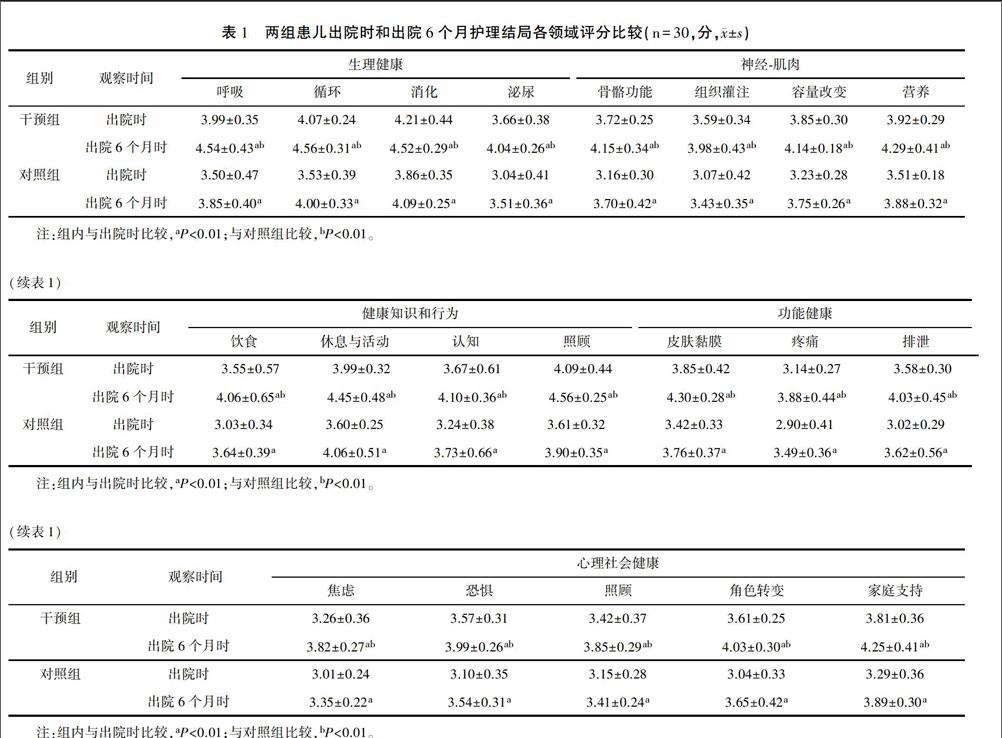护理结局理论模型在肾病综合征患儿的应用
2015-08-15王艳芽陆柳雪王月华麻凤娇梁彩肃许淑萍
王艳芽 陆柳雪 王月华 麻凤娇 梁彩肃 许淑萍
【摘要】目的探讨护理结局理论模型在肾病综合征患儿的应用效果。方法按随机数字表法将60例肾病综合征患儿分为对照组和干预组各30例,对照组按整体护理模式进行护理,干预组构建护理结局理论模型并实施护理干预,采用《护理结局分类(NOC)》于出院时和出院6个月时分别对两组患儿进行评分,比较两组患儿生理健康、健康知识和行为、功能健康、心理社会健康4个领域护理结局评分。结果两组患儿出院6个月生理健康、健康知识和行为、功能健康、心理社会健康4个领域内容评分与出院时比较差异均有统计学意义(P<0.01),两组评分均显著改善,但干预组改善的程度大于对照组(P<0.01)。结论护理结局理论模型能有效提高肾病综合征患儿的护理效果,提高患儿的生存质量。
【关键词】护理结局;护理结局分类系统;肾病综合征;小儿;护理效果
中图分类号:R473.72文献标识码:ADOI:10.3969/j.issn.10031383.2015.03.020
Application of nursing outcome theory model on children with nephrotic syndrome
WANG Yanya1,LU Liuxue2,WANG Yuehua1,MA Fengjiao1,LIANG Caisu1,XU Shuping1
(1. Maternal and Child Health Hospital of Debao,Debao 533700;2.Affiliated Hospital of
Youjiang Medical University for Nationalities,Baise 533700,Guangxi,China)
【Abstract】ObjectiveTo explore application effect of nursing outcome theory model in children with nephrotic syndrome.Methods60 children with nephrotic syndrome were divided into control group and intervention group according to random number table,with 30 cases in each group.Holistic nursing model was carried out to the control group,while the nursing outcome theory model was established and implemented in the intervention group.Nursing Outcomes Classification (NOC) was used to score both groups when patients discharged from hospital and 6 months after discharge,respectively.Nursing outcome scores of 4 areas which included physical health,health knowledge and behavior,functional health and sociopsychological health of the children were compared.Results Difference of scores of physical health,health knowledge and behavior,functional health and sociopsychological health 6 months after discharge and those on the time of discharge was statistically significant (P<0.01).Scores of both groups significantly improved,but those of the intervention group improved more significantly than those of the control group(P<0.01).ConclusionNursing outcome theory model can effectively improve the nursing effect of children with nephrotic syndrome and their quality of life.
【Key words】nursing outcome;Nursing Outcomes Classification Systems;nephrotic syndrome;children;nursing effect
肾病综合征(Nephrotic Syndrome,NS)是一组以大量蛋白尿、水肿、低蛋白血症为表现的临床综合征,是儿童常见的肾小球疾病[1~2]。护理结局是护理敏感性病人结局的简称,常与病人结局混用,是指可以测得连续变化的、应答于护理措施的个人、家庭或社区的状态、行为和感知,护理结局可证实病人是否对所提供的护理措施有反应,帮助护士进行临床决策[3~4]。以护理结局为导向,通过护理结局分类系统(Nursing Outcome Classification,NOC)测量病人结局,评价护理服务质量的护理结局理论模型目前国内已应用于部分研究中[5~6]。为提高护理效果,我院构建护理结局理论模型并应用于NS患儿的护理干预中,取得满意的效果,现总结报告如下。1对象与方法1.1对象选取2012年1月至2014年6月我院儿科病房收治的NS患儿60例为研究对象,其中男33例,女27例;年龄7~13岁,平均(8.5±2.0)岁;病程1个月~12年,平均(6.2±2.0)年;疾病类型:肾炎型19例,单纯型41例;独生子女7例,非独生子女53例;城镇25例,农村35例。按随机数字表法将60例患儿分为对照组和干预组各30例,两组患儿的年龄、性别、病程、疾病类型、居住地等一般情况比较差异无统计学意义(P>0.05),具有可比性。endprint

